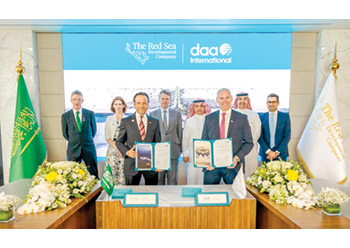TRSDC rebrands as Red Sea Global
01 November 2022
The Red Sea Development Company (TRSDC), the developer behind the world’s most ambitious regenerative tourism project coming up in Saudi Arabia and Amaala, has announced its transformation into Red Sea Global (RSG) – a rebrand to represent our status as a global multi-project developer.
“With The Red Sea and Amaala we’ve proven our ability to realise mega-scale responsible developments that positively shape the futures of both the people who we welcome and employ, and the places in which we operate,” said John Pagano, CEO of TRSDC.
“The announcement marks the start of our evolution into a truly global developer that can lead the category towards a new archetype for development. We are not only expanding our footprint to help create massive economic opportunities – valued at hundreds of billions worth of riyals – for the people of Saudi Arabia. We also want to set new global standards in development and inspire the industry to do better.”
Airport Operator
Meanwhile, TRSDC has confirmed daa International as the operator of the Red Sea International (RSI) airport, which is on track to become the region’s first-ever carbon-neutral airport.
The agreement covers operations and general maintenance services worth close to SR1 billion ($266.3 million), said TRSDC. As per the deal, daa International will serve as the operator for RSI in 2023, overseeing design consultancy, management, and operations in accordance with the provisions of Saudi General Authority of Civil Aviation (GACA) and the International Civil Aviation Organization (ICAO).
“Ahead of welcoming our first guests early next year, Red Sea International is ushering in a carbon-neutral, net-zero era for airport designs and operations,” remarked Pagano.
“As the region’s first-ever airport powered by 100 per cent renewable energy, RSI will serve as an innovative blueprint for decarbonised urban destinations of the future,” he stated.
RSI, designed Foster + Partners, is on track to welcome its first passengers in 2023, with capabilities to serve an estimated one million tourists per year by 2030.
- Key phases of Jabal Omar nearly ready
- New firm set up to develop downtown areas
- TRSDC rebrands as Red Sea Global
- Logistics park to be built at Jeddah port
- Daikin launches new factory in kingdom
- Ajdan unveils lifestyle project in Al Khobar
- Diriyah to build its version of Champs-Elysees
- Roshn opens sale of new Sedra phase
- NPCC breaks ground on fabrication yard



